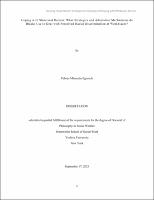Please use this identifier to cite or link to this item:
https://hdl.handle.net/20.500.12202/8007| Title: | Coping with Structural Racism: What Strategies and Adaptation Mechanisms do Blacks Use to Deal with Perceived Racial Discrimination at Workplaces? |
| Authors: | Mason, Susan Egeruouh, Fabian Mbamalu |
| Keywords: | Black studies labor relations Black history Emotion-focused Problem-focused Racism Coping Stress Workplace |
| Issue Date: | 17-Sep-2021 |
| Citation: | Egeruoh, F.M. (2021, September 17). Coping with Structural Racism: What Strategies and Adaptation Mechanisms do Blacks Use to Deal with Perceived Racial Discrimination at Workplaces? (Publication No.28772318) [Doctoral dissertation, Yeshiva University]. ProQuest Dissertations & Theses Global. |
| Series/Report no.: | ProQuest Dissertations and Theses Global;Publication No.28772318 |
| Abstract: | This study examined the strategies Black workers used to navigate, negotiate, minimize, or deal with perceived workplace racial discrimination encounters and how they coped with it. The type of study undertaken was a phenomenological qualitative investigation as defined by Creswell (2018). Using Lazarus and Folkman’s (1984) theoretical framework as a guide, data were collected using Qualtrics online anonymous survey. Utilizing purposeful and snowball sampling methods, 16 Black workers aged 31 – 74 years old responded to Qualtrics online anonymous survey regarding their experiences with workplace racial discrimination. The data were analyzed using ATLAS.ti 9.0 version Qualitative Data Analysis computer software program. ¶ Nine themes were extracted from the survey responses. Four of these themes were associated with the participants’ experiences with perceived workplace racial discrimination; five themes were related to their coping strategies. Participants’ narratives revealed overt experiences of perceived workplace racism in areas including denials: of promotions, salary increases, training, and upward mobility. Participants’ narratives also revealed themes about harassment, being underrated, and not recognized for their accomplishments. ¶Participants reported utilizing a wide array of coping strategies, consistent with Lazarus and Folkman's (1984) theoretical framework. Findings revealed that they regulated stress from threat and challenge appraisals with problem-focused strategies and utilized emotion-focused coping strategies to change the way they felt about threats. Participants concluded that racism played a significant part in their frustration with the overall workplace environment. ¶The most relevant NASW Codes of Ethics relevant to this research is for social workers to: “work to prevent and eliminate domination of, exploitation of, and discrimination against any person, group, or class based on race, ethnicity or national origin. This includes Blacks racism and police brutality (NASW, 2018) |
| Description: | Doctoral dissertation, PhD / Open Access |
| URI: | https://hdl.handle.net/20.500.12202/8007 https://ezproxy.yu.edu/login?url=https://www.proquest.com/dissertations-theses/coping-with-structural-racism-what-strategies/docview/2651672878/se-2 |
| Appears in Collections: | Wurzweiler School of Social Work: Dissertations |
Files in This Item:
| File | Description | Size | Format | |
|---|---|---|---|---|
| Fabian Egeruoh from ProQuest 17 Sept2021.pdf | 1.95 MB | Adobe PDF |  View/Open |
This item is licensed under a Creative Commons License

